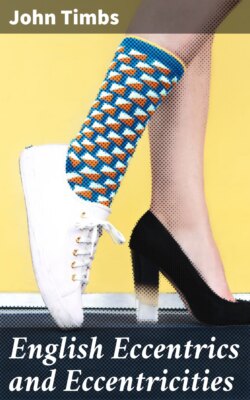Читать книгу English Eccentrics and Eccentricities - John Timbs - Страница 28
На сайте Литреса книга снята с продажи.
The Eccentric Miss Banks.
ОглавлениеTable of Contents
Oddities of dress were half-a-century ago much oftener to be seen than in the present day; or, rather, their singularities were more grotesque than the peculiarities of the present day. John Thomas Smith, writing in 1818, says—"It is scarcely possible for any person possessing the smallest share of common observation to pass through the streets in London without noticing what is generally denominated a character, either in dress, walk, pursuits, or propensities." At the head of his remarks on the eccentricity of some of their dresses he places Miss Sophia Banks, Sarah, the sister of Sir Joseph, who was looked after by the eye of astonishment wherever she went, and in whatever situation she appeared. Her dress was that of the Old School; her Barcelona quilted petticoat had a hole on either side for the convenience of rummaging two immense pockets, stuffed with books of all sizes. This petticoat was covered with a deep stomachered gown, sometimes obscuring the pocket-holes, similar to many of the ladies of Bunbury's time, which he has introduced into his prints. In this dress she might frequently be seen walking, followed by a six-foot servant with a cane almost as tall as himself. Miss Banks, for so that lady was called for many years, was frequently heard to relate the following curious anecdote of herself: after making repeated inquiries of the wall-vendors of halfpenny ballads for a particular one which she wanted, she was informed by the claret-faced woman who strung up her stock by Middlesex Hospital gates, that if she went to a printer's in Long Lane, Smithfield, probably he might supply her ladyship with what her ladyship wanted. Away trudged Miss Banks through Smithfield: but before she entered Mr. Thompson's shop, she desired her man to wait for her at the corner, by the plum-pudding stall. "Yes, we have it," was the printer's answer to her interrogative. He then gave Miss Banks what is called a book, consisting of many songs. Upon her expressing her surprise when the man returned her eightpence from her shilling, and the great quantity of songs he had given her, when she only wanted one—"What, then!" observed the man, "are you not one of our characters? I beg your pardon."
This lady and Lady Banks, out of compliment to Sir Joseph, who had been deeply engaged in the production of wool, had their riding-habits made of his produce, in which dresses the two ladies at one period on all occasions appeared. Indeed, so delighted was Miss Banks with this overall covering, that she actually gave the habit-maker orders for three at a time, and they were called Hightum, Tightum, and Scrub. The first was her best, the second her second-best, and the third her every-day one.
Once when Miss Banks and her sister-in-law visited a friend with whom they were to stay several days, on the evening of their arrival they sat down to dinner in their riding-habits. Their friend had a large party after dinner to meet them, and they entered the drawing-room in their riding-habits. On the following morning they again appeared in their riding-habits; and so on, to the astonishment of every one, till the conclusion of their visit.
Although Miss Banks paid great attention to many persons, there were others to whom she was wanting in civility. A great genius, who had arrived a quarter-of-an-hour before the time specified on the card for dinner, was shown into the drawing-room, where Miss Banks was putting away what are sometimes called rattletraps. When the visitor observed, "It is a fine day, ma'am," she replied, "I know nothing at all about it. You must speak to my brother upon that subject when you are at dinner." Notwithstanding the very singular appearance of Miss Banks, she was, when in the prime of life, a fashionable whip, and drove four-in-hand. Miss Banks died in 1818.
